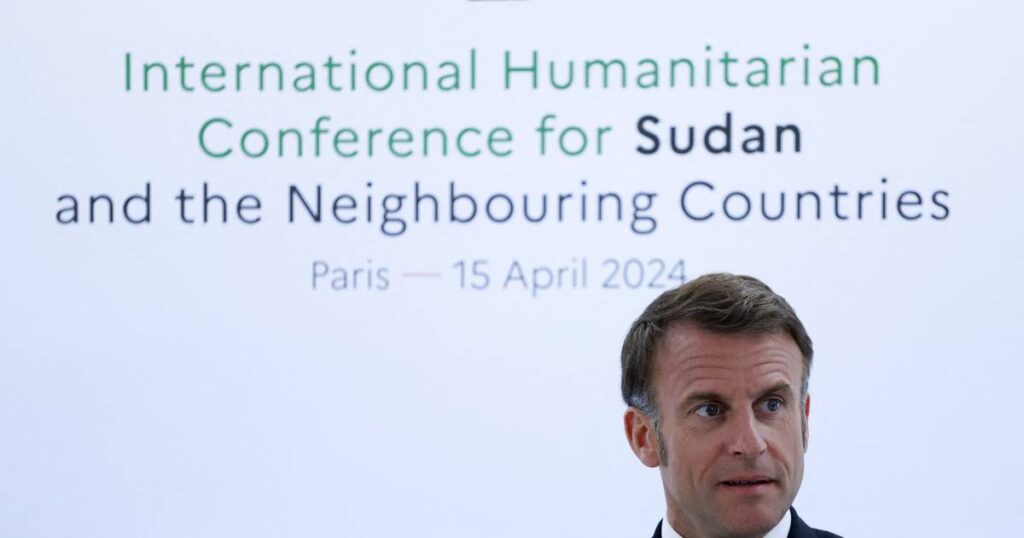French President Emmanuel Macron announced that donors around the world have pledged more than 2 billion euros in aid to Sudan, where a year of war has pushed its people to the brink of starvation.
Macron spoke at the end of an international conference in Paris aimed at increasing support for the Sudanese people. He did not provide a detailed timeline or breakdown of the funding.
:quality(70)/cloudfront-eu-central-1.images.arcpublishing.com/irishtimes/UTTOFZOPU52QXBEKFD2W753FBQ.jpg)
In a final statement, top diplomatic envoys, UN officials and aid agencies gathered at the conference also called on Sudan's parties to the conflict to end rights abuses and allow access to humanitarian aid. Members of Sudan's civil society also attended the Paris conference, but neither the Sudanese military nor rival militia groups were represented.
Sudan was plunged into conflict in April last year when simmering tensions between the military and paramilitary rapid support forces escalated into open fighting in the capital Khartoum and other parts of the country. Mr Macron said this was “one of the world's worst humanitarian crises” and created a “real risk of starvation”.
United Nations humanitarian operations will need about $2.7 billion this year to reach 24 million people, nearly half of Sudan's 51 million people, with food, medical care and other supplies. So far, donors have provided only about 5%, or $145 million, according to the United Nations Humanitarian Office, known as OCHA.
“Today's aid to Sudan is 22 billion euros,” Macron said after Monday's meeting.
UN Secretary-General António Guterres called on the international community to donate generously and support UN life-saving efforts to help Sudanese people trapped in a “bloody nightmare”.
More than 14,000 people have been killed and at least 33,000 injured in the year-long war. According to the United Nations, nearly 9 million people have been forced to flee their homes to safer areas within Sudan or to neighboring countries. Hunger, sexual violence against women and girls, and continued displacement are widespread, and much of the country's infrastructure, including homes, hospitals, and schools, has been reduced to rubble.
“We cannot erase this nightmare from our view,” Guterres said in a video message to the Paris conference. “It's time to support the Sudanese people. It's time to silence the guns.”
French Foreign Minister Stephane Séjourne said the conference's aim was to mobilize humanitarian funds to help the Sudanese people, victims of both a “terrible war” and “international indifference.”
“It's a monumental task,” Sejourne said. “This is a war that the Sudanese people did not want and one that will only create chaos and suffering.”
European Union crisis commissioner Janez Lenarčić said the 27 member states want to ensure Sudan is not forgotten as wars in Gaza and Ukraine dominate international news.
“The Sudanese people caught up in this emergency have become almost invisible,” Lenaršić said. He said Sudan had become one of the worst humanitarian disasters in the history of the African continent, adding: “It is our duty not to look away.”
International Committee of the Red Cross President Mirjana Sporjaric warns that humanitarian work is becoming increasingly politicized in Sudan, with humanitarian workers risking their lives to get vital aid to people. did.
She called on all parties to the war to facilitate “the safe, rapid and unhindered transport of humanitarian personnel and supplies into and within Sudan through all available routes.”
“We cannot pursue military superiority without considering the human cost,” Sporjaric said.
The United States and Saudi Arabia initially led efforts to find a negotiated solution to the conflict. But those efforts were unsuccessful, and since October the fighting has been overshadowed by the Israeli-Hamas war in the Gaza Strip, threatening to escalate into a broader regional conflict.
Meanwhile, relief workers warn that Sudan is heading towards an even bigger famine disaster, with mass casualties likely to occur in the coming months. Food production and distribution networks have collapsed, and aid agencies are unable to reach the hardest-hit areas. The conflict has also been marked by widespread reports of atrocities, including killings, forced displacement, and rape, particularly in the capital and western Darfur region.
According to OCHA, at least 37 percent of the population above crisis level suffers from hunger. Save the Children has warned that around 230,000 children, pregnant women and mothers of newborns could die from malnutrition in the coming months.
“Hunger is a reality in Sudan,” said Abdallah al-Dardari, United Nations Development Program regional director. He told diplomats gathered in Paris that humanitarian workers should have access to and vital supplies to millions of people caught up in conflicts “that are rapidly deteriorating due to a lack of respect for human rights and international law.” He appealed for increased funding for aid.
The army, led by General Abdul Fattah Burhan, and the rapid support force, commanded by General Mohammed Hamdan Dagalo, are cutting through Khartoum, exchanging indiscriminate fire with each other. In 2021, they were uneasy allies who led a military coup. They overthrew the internationally recognized civilian government that was supposed to lead Sudan's democratic transition. – AP

